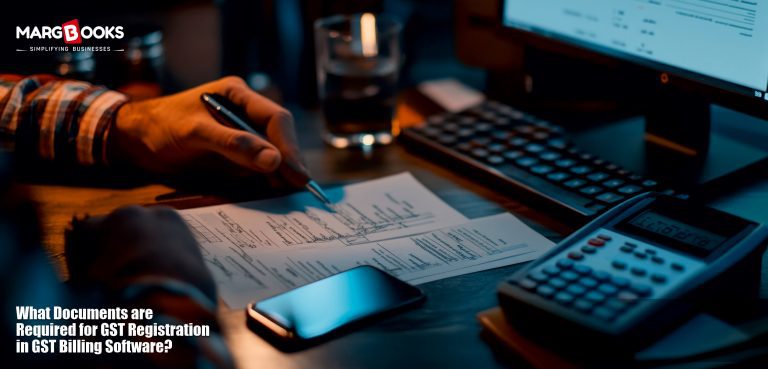GST (Goods and Services Tax) registration is an essential step for businesses in India to comply with the tax regime and be eligible to collect tax on behalf of the government. If you’re a business owner, you likely need to register for GST to ensure smooth operations, especially if your annual turnover crosses the prescribed threshold limit. While the GST registration process itself is relatively straightforward, one of the key steps involves submitting the correct documents.
In this blog, we will walk you through the list of documents required for GST registration, and how using an Online GST Billing Software like MargBooks can simplify your registration process. Let’s get started!
What is GST Registration?
Before we dive into the documents, let’s first understand what GST registration is. GST registration is the process through which a business obtains a unique Goods and Services Tax Identification Number (GSTIN). This registration allows businesses to collect tax from their customers, claim input tax credit (ITC), and comply with GST rules and regulations.
The process of GST registration can be done online through the GST portal, and having the correct documents is crucial for the approval of your application. Once registered, you’ll also be able to seamlessly integrate GST into your operations through GST Billing Software, ensuring accurate invoicing and tax calculations.
Why is GST Registration Important for Your Business?
- Legal Recognition: GST registration provides your business with legal recognition, making it easier to expand operations, enter into contracts, and build credibility.
- Tax Benefits: Registered businesses can claim input tax credit (ITC) for the GST paid on purchases, which helps reduce the overall tax burden.
- Smooth Business Operations: With the right GST registration and an integrated GST Billing Software, the process of tax filing becomes seamless, reducing errors and improving efficiency.
- Cross-Border Transactions: GST registration is mandatory if you are engaging in inter-state sales. Without GSTIN, you won’t be able to collect tax or even pass on the tax credit.
Documents Required for GST Registration
To register for GST, you need to submit specific documents as proof of your business identity, address, and ownership. Below is a list of documents required for GST registration:
1. PAN Card of the Business/Applicant
For GST registration, your business must have a PAN (Permanent Account Number) card. Whether you are registering as a sole proprietor, partnership, or company, PAN is a mandatory requirement.
- For sole proprietors: PAN of the individual.
- For companies: PAN of the company.
- For partnership firms: PAN of the partnership firm.
2. Proof of Business Registration or Incorporation Certificate
This document acts as proof that your business is legally registered. The type of document required will depend on the business structure:
- Sole proprietorship: A copy of the business’s registration certificate or any other document proving business existence (such as GST application, Income Tax Returns, etc.).
- Partnership firms: Partnership deed.
- Private limited companies: Certificate of incorporation issued by the Ministry of Corporate Affairs (MCA).
3. Identity and Address Proof of the Business Owner/Authorized Signatory
The identity proof could be a government-issued ID such as an Aadhaar card, passport, voter ID, or driver’s license. The address proof can be a utility bill (electricity, water, or gas bill) or a bank statement, but it must not be older than two months.
4. Photograph
A passport-sized photograph of the applicant or authorized signatory needs to be submitted. The image should be clear and easily recognizable.
5. Business Address Proof
You will need to provide proof of the business premises, which could be:
- Own premises: A copy of the property tax receipt or rent agreement.
- Rented premises: A copy of the rent agreement, along with the NOC (No Objection Certificate) from the owner of the premises.
- For home-based businesses: A utility bill (electricity or water bill) in the name of the owner is acceptable.
6. Bank Account Statement or Cancelled Cheque
A bank account statement or a cancelled cheque with the business’s name mentioned is required to verify that the business operates an active bank account. The bank account details are necessary to link your business to the GST system for payment and refunds.
7. Digital Signature
A digital signature is required when submitting GST registration applications for private limited companies, limited liability partnerships (LLPs), or any other entity requiring the filing of documents electronically. The signature ensures the authenticity of the application.
8. Additional Documents for Specific Cases
- For Casual Taxable Person: If your business is a casual taxable person, a declaration regarding the expected turnover and nature of the business will be required.
- For Non-Resident Taxable Person: Non-residents need to provide details about their nature of business and the goods and services provided in India.
How Online GST Billing Software Like MargBooks Can Help
Once your business is registered for GST, integrating an Online GST Billing Software like MargBooks makes managing your GST-related tasks incredibly easy. Here’s how it can help streamline your GST registration and invoicing process:
1. Automatic GST Calculation
MargBooks helps businesses automatically calculate the GST on products and services at the time of billing. Whether you are generating invoices, receipts, or quotations, it ensures accuracy in tax calculations and prevents human error.
2. Seamless GST Filing Integration
The GST Billing Software automatically tracks your GST payments and helps you file returns directly from the software, reducing the hassle of manual entries and the risk of errors.
3. Easy Invoicing and Compliance
The software ensures that all your invoices are GST-compliant, and it generates proper GST invoices for your clients, making it easier for you to claim input tax credit.
4. Records and Reports
MargBooks maintains records of all transactions, making it easier to track and audit your GST returns. You can also generate reports on GST-paid purchases, sales, and liabilities to ensure your books are up-to-date.
5. Save Time and Effort
GST billing software like MargBooks not only reduces the time you spend on administrative tasks but also helps you keep everything in compliance with the law. This reduces the chances of penalties due to incorrect GST filings.
Conclusion
GST registration is an important milestone for your business, enabling you to expand your reach and ensure compliance with the tax laws. Gathering the right documents is the first step towards successful registration. Once you’re registered, tools like Online GST Billing Software can simplify your day-to-day operations, helping you manage invoices, track tax payments, and file returns with ease.
Whether you’re a small business or a large enterprise, tools like MargBooks offer the perfect blend of convenience and compliance. Start using a GST Billing Software today and ensure that your business stays on top of the tax game!




